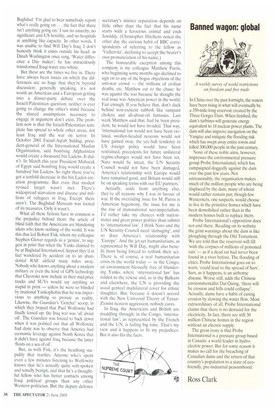Banned wagon: global
In China over the past fortnight, the waters have been rising in what will eventually be a 350-mile-long reservoir created by the Three Gorges Dam. When finished, the dam's turbines will generate energy equivalent to 18 nuclear power plants. The dam will also improve navigation on the Yangtze and mitigate the flooding risk which has swept away entire towns and killed 300,000 people in the past century.
None of these noble aims, however, impresses the environmental pressure group Probe International, which has campaigned doggedly against the dam over the past few years. Not unreasonably, the organisation makes much of the million people who are being displaced by the dam, many of whom would rather remain put; though few Westerners, one suspects, would choose to live in the primitive homes which have been demolished rather than in the modern homes built to replace them.
Probe International's opposition does not end there. Reading on its website the grim warnings about the dam is like ploughing through the Old Testament. We are told that the reservoir will fill 'with the corpses of millions of poisoned rats' — as if a dead rat had never been found in a river before. The flooding of cities. Probe International goes on to warn, 'could lead to the spread of Sars'. Sars, as it happens, is an airborne disease. Worse still, adds the Chinese environmentalist Dai Quing, 'there will be erosion and hills could collapse'. Actually, dams have a habit of easing erosion by slowing the water flow. Most extraordinary of all, Probe International claims that there is no demand for the electricity. In fact, there are still 30 million Chinese homes in the region without an electric supply.
The great irony is that Probe International is a pressure group based in Canada: a world leader in hydroelectric power. But for some reason it makes no call for the breaching of Canadian dams and the return of that country's population to a state of ecofriendly, pre-industrial peasanthood.
Ross Clark


































































































 Previous page
Previous page